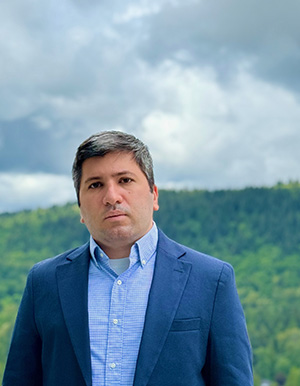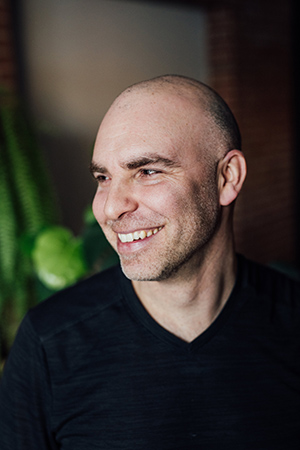The Integrity of the Gaze:
Daniel Allen Cox interviews
Siavash Saadlou

Past judge and contributor Daniel Allen Cox talks with Siavash Saadlou, judge for our 2025 Constance Rooke CNF Prize (accepting entries now, with an Early Bird discount until June 30). They discuss writing that leans into lyricism, translation as the ultimate act of caring, and how uncertainty is an entry point to honest and resonant work.
Siavash Saadlou is a Pushcart Prize-nominated writer and literary translator whose memoir excerpt, “My Mom Told Me,” was selected as a Notable Essay for the Best American Essays 2023. His poems have been anthologized in Woman, Life, Freedom (Guernica Editions) and Essential Voices: Poetry of Iran and Its Diaspora (Green Linden Press). His short stories, essays, and translations have appeared in Ploughshares, American Literary Review, and New England Review, among other journals. He is the winner of the 2024 McNally Robinson Booksellers Creative Nonfiction Prize, the 2024 Susan Atefat Creative Nonfiction Prize, the 2023 Constance Rooke Creative Nonfiction Prize, and the 55th Cole Swensen Prize for Translation. Most recently, he was second place in the 2025 Tobias Wolff Award for Fiction. He has received a Tennessee Williams Scholarship from the Sewanee Writers’ Conference and a fellowship from Vermont Studio Center.
How has working as a translator informed how you read and write?
I think the literary arts always demand utmost care from those who practice them, and translation, to me, constitutes the ultimate act of caring. When you translate, you become deeply conscious of every choice you make, because you’ve been entrusted with reimagining—and bringing to fruition— someone else’s words in a new language, a new home as it were. That kind of responsibility sharpens your sensitivity not just to meaning, but to tone and rhythm, even silence. Translation has made me more attuned to the small, almost invisible moves a writer makes, and that kind of attentiveness has become the foundational underpinning of how I read a piece of literature, and reading, as Annie Proulx once famously said, is the finest teacher of how to write.
In addition to being a prolific writer and translator, you're a writing teacher. What are some of the literary concerns on the minds of your students? What questions do you prompt them to consider?
I’m not teaching as much these days, but when I do, I find that many students are wrestling with questions of voice and authenticity: how to, for example, sound like themselves on the page, and more importantly, how to trust that their voice is enough. I’ve never believed in the idea of “giving voice to the voiceless,” because to me, no writer or artist is voiceless. But those of us coming from so-called “marginalized” backgrounds find ourselves under the gun to become a ventriloquist because we’re expected to speak on behalf of entire communities or cultures. I find that expectation to be very reductive because it results in a caricature of the writer’s individual experience.
One thing I always ask my students is: What do you want the reader to really see or hear in this piece? What emotions are you hoping to stir? And how close, or far, do you think you are from that aim right now? I also often return to the question: Where is the energy in this piece taking you, and are you following it, or avoiding it out of fear? Above all, I try to remind students that uncertainty isn’t a weakness in writing. In many cases, it’s the entry point to the most honest and resonant work.
What are you reading these days and what keeps you interested in the material? Are there any intersections of creative nonfiction and poetry that you’d like to share?
Lately, I’ve been immersed in short fiction, mainly because I’m finalizing my debut short story collection titled Think of the Sea. I’ve been revisiting old favorites like Ottessa Moshfegh’s Homesick for Another World and Jhumpa Lahiri’s Interpreter of Maladies—books that have precision and emotional complexity packed into such small spaces. I’ve also been in awe of Jamel Brinkley’s work; his stories feel both richly textured and infinitely alive.
As for intersections between creative nonfiction and poetry, I often think about Gary Snyder’s definition of poetry because he once referred to it as “very high-quality information.” I guess you could say that great poetry and great works of nonfiction, in one way or another, offer high-quality information. I also believe that both strive toward a certain level of emotional truth-telling. Good memoir, like good poetry, is about the integrity of the gaze you turn back on your own life.
You've won quite a few writing prizes. What advice would you give to writers about deciding to submit and preparing their work?
I generally bristle at the idea of giving advice, but I do encourage all writers to be unafraid of sharing their work with the world. And “the world” doesn’t have to mean a prize committee or a publisher; it can simply be one thoughtful reader whose engagement matters to you. The problem with literature, or the beauty of it, is that unlike some other art forms, it only fully comes alive when it’s read. Until then, it remains no more than a private act. The reading is what helps a work of literature become fully imagined.
If anything, I’d say this: share your work because it matters to you, because you’re here and you have something to contribute to the conversations of the world. That, to me, is the heart of it. The rest is what happens if you’re lucky.
What are you looking for in a winning entry?
I’m drawn to stories that jump off the page—work that makes me care about something I didn’t even realize mattered to me. I also have a soft spot for writing that leans into lyricism: prose that pays attention to its own music and carries emotional weight not just through what is said but through how something is said. Ultimately, I want to be moved—whether it’s by the beauty of the language, the sharpness of the insight, or the sheer force of feeling behind the work.

Daniel Allen Cox









